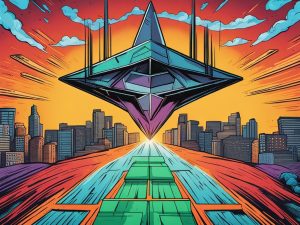Ontology Gas vs. Ontology Coin: What’s the Difference?
If you’re new to the world of cryptocurrency, you may have come across terms like Ontology Gas and Ontology Coin. These two terms are often used interchangeably, but they actually refer to different aspects of the Ontology blockchain platform. In this article, we’ll break down the difference between Ontology Gas and Ontology Coin so that you can better understand how they function within the Ontology ecosystem.
What is Ontology?
Before we dive into the specifics of Ontology Gas and Ontology Coin, it’s important to have a basic understanding of what Ontology is. Ontology is a high-performance public blockchain and distributed collaboration platform that aims to solve the issues of identity security and data integrity in the digital world.
Ontology provides a variety of decentralized services, including distributed identity framework, distributed data exchange, and collaboration framework for building a distributed trust system. It’s designed to be flexible, modular, and customizable, making it an attractive option for businesses and organizations looking to implement blockchain technology.
What is Ontology Gas (ONG)?
Ontology Gas (ONG) is the utility token used to pay for network fees on the Ontology blockchain. In a similar way to how gas powers a car, ONG powers transactions on the network. When you perform transactions or execute smart contracts on the Ontology blockchain, you’ll need to use ONG to pay for the computational resources required.
Essentially, ONG is used as a form of payment for using the network. It’s important to note that ONG is separate from ONT, which is the native cryptocurrency of the Ontology blockchain. While ONT represents stake in the network and can be staked for rewards, ONG is used specifically for paying network fees.
How is ONG Generated?
One key aspect of ONG is its generation process. ONG is generated through a process known as “staking.” Staking involves holding ONT tokens in an official wallet or on an exchange that supports staking rewards. By holding ONT tokens in this manner, you’ll automatically generate ONG at a predetermined rate.
The exact rate at which ONG is generated through staking can vary depending on factors such as network activity and token supply. However, by staking your ONT tokens, you can passively accumulate ONG over time without needing to actively participate in any complex mining processes.
What Can You Do with ONG?
Now that you understand what ONG is and how it’s generated, you may be wondering what exactly you can do with it. As mentioned earlier, ONG is primarily used for paying network fees on the Ontology blockchain.
- Transaction Fees: When you send ONT or any other asset on the Ontology blockchain, you’ll need to pay a small amount of ONG as a transaction fee.
- Smart Contract Execution: If you want to deploy or execute smart contracts on the Ontology blockchain, you’ll also need to use ONG to cover the associated costs.
- DApp Usage: Some decentralized applications (DApps) built on top of the Ontology platform may require users to pay small amounts of ONG for various interactions within the application.
In addition to these primary uses, there may be other applications or services within the Ontology ecosystem that require payment in ONG.
What is Ontology Coin (ONT)?
In contrast to ONG, which serves as a utility token for paying network fees, Ontology Coin (ONT) is the native cryptocurrency of the Ontology blockchain. ONT represents stake in the network and can be used for staking rewards as well as participating in governance activities within the ecosystem.
When you hold ONT tokens, you essentially have ownership stake in the platform and can participate in various activities that help secure and govern the network. This gives ONT intrinsic value within the ecosystem beyond just being used for transactions or payments.
Earning Rewards with ONT
One key benefit of holding ONT tokens is that you have the opportunity to earn rewards through staking. By staking your ONT tokens through an official wallet or supported exchange, you can contribute to securing and validating transactions on the network while earning additional ONT as a reward.
The exact mechanism for earning staking rewards with ONT can vary depending on factors such as token lock-up periods and network participation rates. However, by actively participating in staking activities, you have potential to earn additional ONT over time.
The Relationship Between ONG and ONT
It’s important to understand that there’s an inherent relationship between ONG and ONT within the Ontology ecosystem. While they serve different purposes – with ONG being used for transactional fees and ONT representing ownership stake – they’re interconnected in several ways.
- Governance: Holding ONT tokens allows you to participate in governance activities within the ecosystem such as voting on proposals or protocol upgrades. This gives holders some level of influence over how the platform evolves over time.
- Rewards: Both ONG and ONT offer opportunities for earning rewards within the ecosystem – whether it’s through passive generation of ONG via staking or active participation in securing and governing the network using ONT.
- Economic Model: The economic model of Ontology relies on both ONG and ONT working together to ensure smooth operation of transactions and incentives for stakeholders within the ecosystem.
Symbols & Acronyms
- ONG: Abbreviation for “Ontology Gas,” which serves as a utility token used for paying network fees on the Ontology blockchain.
- ONT: Abbreviation for “Ontology Coin,” which represents ownership stake in the platform and serves as its native cryptocurrency.
- DApp: Abbreviation for “decentralized application,” which refers to applications built on top of blockchain platforms like Ontology.
Frequently Asked Questions (FAQs)
1. Can I convert between ONG and ONT?
No direct conversion exists between ONG and ONT since they serve different purposes within the ecosystem. However, if needed, users can trade them on supported exchanges.
2. How do I start earning rewards with my ONT tokens?
To start earning rewards with your ONT tokens through staking, ensure they are held in an official wallet or supported exchange that offers staking services.
3. What are some examples of DApps built on top of Ontology that require payment in ONG?
Certain decentralized applications built on top of Ontology may require users to pay small amounts of ONG for various interactions within their platforms such as gaming apps or decentralized finance protocols.
With this understanding now behind us let’s go ahead invest wisely!


 By
By
 By
By
 By
By
 By
By
 By
By
 By
By